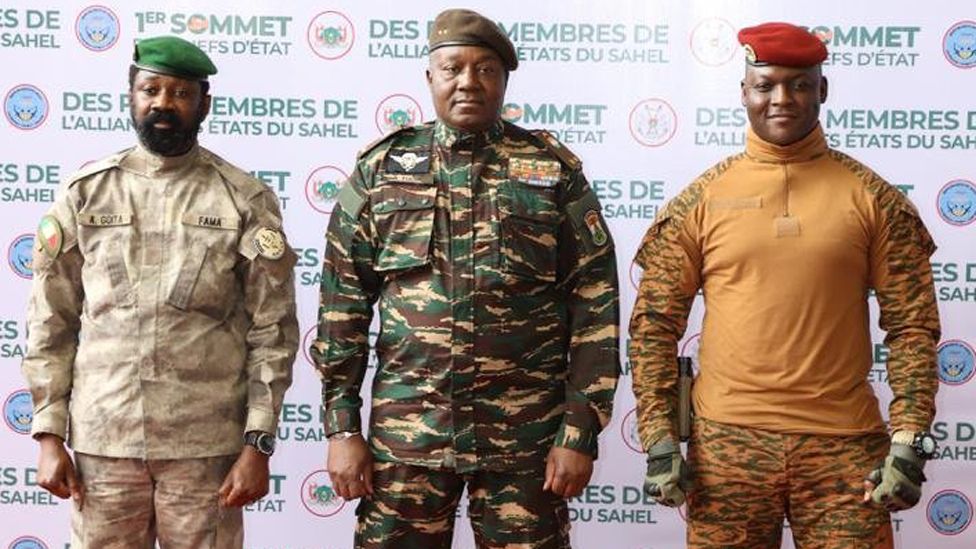
Sierra Leonean President Julius Maada Bio, who took over the rotating chairmanship of the Economic Community of West African States (ECOWAS) in June, is optimistic about reintegrating Mali, Burkina Faso, and Niger into the regional bloc.
- President Julius Maada Bio of Sierra Leone, current ECOWAS chair, aims to reintegrate Mali, Burkina Faso, and Niger into the bloc.
- These countries left ECOWAS after forming the Alliance of Sahel States (AES) in response to political tensions and Western influence.
- Reintegrating these nations would symbolize diplomatic progress and strengthen the bloc’s regional cooperation.
The appeal was made during a courtesy visit from Dr. Omar Alieu Touray, President of the ECOWAS Commission, on Tuesday, August 5th, 2025, at the Sierra Leone States House
He affirmed that such relationships are vital for promoting trade, facilitating free movement, and ensuring peace and security in the region.
President Bio also reaffirmed his support for democratic transitions and electoral processes in the subregion, pointing to the ongoing transition in Guinea and the forthcoming elections in Côte d’Ivoire and Guinea-Bissau
At the conclusion of a five-day delocalized meeting in Banjul, Gambia, the Chairman of the Joint Committee, Senator Edwin Melvin Snowe Jr., emphasized the importance of unity and regional cooperation.
“We want you back. Let us come together as a team. No matter what, we agree to disagree,” he said
Snowe described the exit of the three countries as a painful experience, noting that the bloc has been united for five decades.
Spotlight on Sahel states’ withdrawal from ECOWAS
These three francophone nations formally withdrew from ECOWAS on January 29, 2025, after forming the Alliance of Sahel States (AES) on July 6, 2024, in Niamey, Niger.

Their decision followed ECOWAS’ call for a return to constitutional rule in Niger after the 2023 coup that ousted President Mohamed Bazoum. Mali and Burkina Faso, already under military rule, aligned with Niger in rejecting the bloc’s demand, reportedly due to perceived Western influence in the region.
Political instability in the Sahel has been escalating for years, with Mali under junta rule since the 2020 coup that ousted President Ibrahim Boubacar Keïta, and Burkina Faso experiencing two coups in 2022 that removed President Roch Marc Christian Kaboré.
These developments have heightened threats from terrorism, illicit arms flows, and economic instability across the region.
In response to the coups, ECOWAS, under then-Chairman Bola Tinubu of Nigeria, imposed targeted sanctions on the junta, including travel bans and asset freezes on junta members and their families, suspension of financial transactions, and closure of borders.
While intended to pressure the junta to restore constitutional order, the sanctions also strained relations between the bloc and erring countries.
However, most sanctions were lifted in March 2024 to alleviate humanitarian conditions, with targeted measures remaining against coup leaders.
At the AES summit, the junta leaders emphasized sovereignty, unity, and resistance to external interference.
Niger’s General Abdourahamane Tiani said: “The Alliance of Sahel States is a platform for our countries to assert our sovereignty, pursue collective security, and promote development. Through this confederation, we reaffirm our commitment to strengthen ties and regional stability,”
Burkina Faso’s Captain Ibrahim Traoré also stressed the importance of independence and regional integration:
“The Alliance of Sahel States is a significant step toward greater integration among our nations. It reflects our people’s desire for freedom, unity, and independence, and we must collectively resist external interference.”
While taking over leadership from Nigeria’s President Tinubu, President Julius Maada Bio outlined four priorities: restoring constitutional order, strengthening democracy, revitalizing regional security cooperation, and advancing economic integration.
He said: “We must engage transitional governments constructively and support member states in building stronger democratic institutions rooted in the rule of law. We must overhaul our collective security architecture, from intelligence sharing to rapid response capabilities, to confront new threats with unity and resolve,”
Bio further highlighted the need for accountability, transparency, and equitable participation in national life while acknowledging the complexities facing West Africa, including terrorism, illicit arms flows, political instability, and transnational crime, particularly in the Sahel and coastal states.
“ECOWAS must reform itself to become more transparent, efficient, and responsive to the needs of its people. This is how we will rebuild trust in regional cooperation,” he stated.
As the bloc navigates this pivotal moment, it faces the challenge of reconciling its commitment to democratic governance with the realities of regional instability.
The departure of Mali, Burkina Faso, and Niger represents a significant shift in West African geopolitics, leaving the future of regional cooperation uncertain. However, their potential re-admission could be regarded as an even more notable achievement for the new chairman.
Olamilekan Okebiorun












